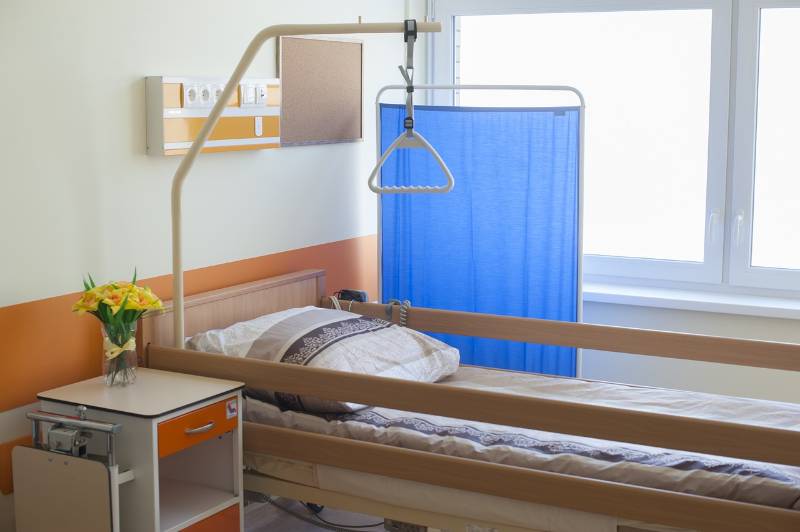How to Open & Run A Care Home
 With an ageing population and ever-rising life expectancy rates, it’s likely that demand for care homes in the UK will increase in the coming years. So, you may feel like now is an appropriate time for starting a care home business. Opening and running a care home is a rewarding experience, but just like setting up any other business, it requires careful planning, dedication, and adherence to regulations.
With an ageing population and ever-rising life expectancy rates, it’s likely that demand for care homes in the UK will increase in the coming years. So, you may feel like now is an appropriate time for starting a care home business. Opening and running a care home is a rewarding experience, but just like setting up any other business, it requires careful planning, dedication, and adherence to regulations.
To help make the first stages of your business planning process as straightforward as possible, we’ve put together this handy guide on how to start a care home. Whether you’re setting up a residential home or nursing home, we’ve got the information you need going forward. This comprehensive guide outlines the steps involved in setting up a care home in the UK and running it, covering the different types of care homes, legal requirements, calculating budget and costs, and more.
- Types of care home
- The legalities of running a care home
- The costs of setting up a care home
- Creating a care home business plan
Types of care home

Generally, a care home provides essential services to vulnerable individuals who require assistance with daily activities. However, there are multiple types of care homes which provide different services. Below we’ll take a closer look at the main types of care home and what they offer.
Residential care homes
Sometimes known as assisted living facilities, residential care homes are designed for individuals who need help with everyday essential activities, such as bathing, dressing, eating, and getting around. These facilities offer a more independent living environment compared to other types of care homes and focus on providing assistance with non-medical tasks. While residential care homes do not provide intensive medical care, staff members here can assist residents with medication reminders, basic health monitoring, and arranging medical appointments. However, they are not equipped to handle more complex medical conditions.
Staff in residential care homes assist residents with daily living and provide social engagement, sometimes in the form of social activities. While some staff members may have basic training in assisting with personal care, the level of medical training is generally lower compared to nursing homes.
Nursing homes
Nursing homes are intended for individuals with more complex medical needs. These facilities provide around-the-clock skilled nursing care and medical services for individuals who require medical supervision, medication management, wound care, rehabilitation therapies, and other medical interventions. Nursing homes are equipped with a higher level of medical equipment and staff than residential care homes. They are capable of managing a wider range of medical conditions and providing ongoing medical care.
As well as providing medical care, nursing homes also offer most, if not all, of the services offered at residential care homes, such as help with day-to-day tasks and help participating in social activities.
Specialist care homes
If you have an interest in or experience with a specific condition, you may want to open a specialist care home. These homes are designed for people with these conditions and are catered to making their daily lives as comfortable and pleasant as possible. One of the most common types of specialist care homes found in the UK is dementia care homes. These facilities provide specialist care to people living with dementia and often staff nurses with specific dementia training.
Respite care homes
Respite care homes offer a safe and supportive environment for individuals in need of care while their primary caregivers take some time off to rest, go on holiday, address personal needs, or manage their other responsibilities. This temporary break can be crucial for maintaining the well-being of the caregiver, as constant caregiving can be physically and emotionally demanding. They can also be used temporarily by patients who have been discharged from hospital but are not yet ready to return to living independently.
Respite care homes typically offer short-term stays, ranging from a few days to a few weeks, depending on the needs of the caregiver and the individual requiring care. Respite care homes often provide various support services such as meals, recreational activities, and social activities. Some respite care homes are equipped to provide medical care, although they do not typically provide the same level of medical services as a nursing home.
The legalities of running a care home

Care homes are heavily regulated, not just for the wellbeing and safety of vulnerable residents, but for the facility’s staff and visitors too. For this reason, it’s important to have a good understanding of the legalities to consider before you open a care home. Below we’ll cover exactly what you need to know from the legal side of things when setting up a care home.
What qualifications do you need to open a care home?
If you plan on being a hands-off owner of the business, you don’t need to obtain any personal qualifications before opening your care home. Care home managers also don’t technically need to obtain any qualifications before working in a care home, although it is highly recommended that they get a Level 5 Diploma in Leadership for Health and Social Care and Children’s and Young People’s Services. Potential managers must also put in an application to the CQC to become an officially registered care home manager. This can be a lengthy process and involves the applicant explaining why they are a good fit for the role, detailing relevant experience, sharing how they plan to manage the care home, proving they are of good character and have the necessary skills.
What licences do you need to open a care home?
While you do not need qualifications to open a care home, you must register with the Care Quality Commission (CQC) as a care provider. The CQC regulates care homes in the UK, so you must register your care home, undergo inspections, and meet their standards for quality and safety. Your application process will include providing the full details of your facility, the details of your registered care home manager, a description of the services you intend to provide and who they are for, as well as proof of financial viability and references. There is no application fee for this process, but if approved you must pay an annual fee.
As previously mentioned, you must also appoint a registered care home manager who will need to apply with the CQC if you aren’t planning on being involved in the day-to-day running of the business.
Other licences and certificates required for a care home business include:
- Food hygiene certificate (you must also register as a food business with your local council)
- Fire safety certificate
- Television licence
What is the legal staff ratio for care homes?
While many of those going into the business assume there must be strict guidelines detailing how many care staff there should be per resident in the UK, there is no legal ratio. The official guidance from the CQC is as follows: “To meet the regulation, providers must provide sufficient numbers of suitably qualified, competent, skilled and experienced staff to meet the needs of the people using the service at all times.” So, while there is no official number, you must employ enough staff to ensure that each of CQC’s five standards are met for every resident. These standards are as follows:
- Safe: Staff, service users, and visitors should always be safe from harm
- Effective: Care must be effective and provide residents with as good a quality of life as possible
- Caring: Residents must be treated with kindness, dignity, and respect
- Responsive: Care must fit each individual’s needs
- Well-led: Leadership and management must ensure that staff are providing good quality of care to every resident
You will likely find that staffing ratios depend on the vulnerability and overall health and wellbeing of residents in your facility. If you have a lot of highly vulnerable service users with complex needs, you will require more staff to ensure their needs are met according to the five standards above.
How many fire wardens should there be in a care home?
Fire safety is crucial in care homes, for both vulnerable residents who may be at higher risk of harm from smoke damage and patients with limited mobility, as well as of course for the general safety of staff and visitors. There are no specific guidelines for the number of fire wardens for care homes, but for any business, it is generally recommended that there is at least one fire warden per 50 people. As a business targeted at helping vulnerable people, you may want to increase this ratio to two or three wardens per 50 for enhanced safety. There must always be one fire warden on shift, so this is important to bear in mind when creating staff rotas.
As well as having designated fire wardens, there are other important steps to take for fire safety. You should conduct regular fire safety training and drills with all of your staff so that everyone has a good understanding of the emergency process. You must also ensure you have adequate evacuation equipment to help service users with restricted mobility reach safety in emergencies.
Other care home regulations and considerations
These licences, certificates, and qualifications are essential to obtain if you plan to open a care home. However, there are a number of other regulations you should take into account when running your new business, one of the most important being DBS checks. Any member of staff who works in a care home must acquire an Enhanced DBS check as they will be coming into contact with one or more “vulnerable adults”. This also applies to people volunteering in your facility.
Another important consideration is first aid training. Like fire safety wardens, having at least one qualified first aider per shift is essential for the wellbeing and safety of staff, visitors, and of course, service users. Your first aiders should have official certification proving their training, such as a First Aid at Work certificate and an Emergency First Aid at Work certificate. On top of this, every member of care staff in your facility should be provided with at least basic first aid training, with refresher courses every three years. You should always have a fully stocked first aid kit at hand to use in emergency situations.
You also need to consider GDPR compliance if you plan on setting up a care home. Not only is this a legal duty, but it is vital for the safety of your service users. Care homes process a significant amount of personal data, including residents' health information, medical records, contact details, and more. GDPR ensures that this sensitive information is handled with the utmost care and is protected from unauthorized access, breaches, or misuse. You should develop a clear and comprehensive privacy policy that residents can easily access, describing the types of data processed, the purposes of processing, retention periods, and the rights of service users. It’s also important to implement strict security measures to protect personal data from breaches, such as by using encryption, conducting regular security assessments, and providing adequate staff training.
The costs of setting up a care home

As with any other business, starting a care home is a major financial commitment and requires a big investment. Here we’ll cover the costs you’ll need to consider when setting up your care home and creating your budget, as well as funding options for your business.
How much does it cost to start a care home in the UK?
There is no one size fits all answer to this, as the cost of opening a care home varies greatly based on a variety of factors, from your chosen location to the size of your business. Costs for the care home building alone can range from £500,000 to £5 million, and there are a number of other operating costs to consider. It is recommended to have at least £2 million to invest in your business to start with, although a larger business will require more funding. The best way to get a good estimate of how much it costs to open a care home is to make a detailed list of costs to consider and create your budget from there.
The costs of opening and running a care home: What to budget for
To help you plan your budget accordingly, we’ve put together a list of costs to take into account when opening a care home:
- Property costs: The most significant initial cost is acquiring the property for your care home. This could involve purchasing a suitable building or renting one.
- Staffing: Hiring qualified and trained staff is essential. This includes care workers, administrative staff, and managers, as well as medical professionals in the case of nursing homes. Budget for staff salaries, benefits, and training.
- Compliance costs: Ensuring compliance with CQC regulations may involve investments in staff training, health and safety measures, and record-keeping systems.
- Operational costs: There are a wide variety of operational costs to consider for opening and running a care home, including:
- Utilities
- Food, janitorial products, and patient care supplies
- Insurance
- Maintenance
- Licences: You must ensure to budget for the range of licences and permits you will need, such as a food hygiene certificate and your annual CQC fee.
- Accounting and legal fees: Hiring an accountant and legal counsel is advisable for navigating the financial and regulatory aspects of setting up and running a care home.
- Taxes and financial planning: Factor in corporate taxes and consider consulting a financial advisor for tax planning.
- Reserve funds: Maintaining reserve funds is crucial for unforeseen expenses and emergencies.
- Marketing and advertising: To attract residents, you'll need to invest in marketing and advertising efforts, including creating a website, brochures, and other promotional materials.
Another major cost for setting up your care home is acquiring the equipment needed to care for less mobile patients. The amount you require will depend on the number of residents in your facility and the level of care and support your service users need. However, the following equipment will likely be essential investments for your business:
- Hoists: These could include patient lifting hoists, overhead hoists, and bath hoists
- Other moving and handling equipment: This could include stand aids, slide sheets, handling belts, and turntables
- Mobility equipment, including wheelchairs and ambulance chairs
- Electric adjustable beds, static mattresses, and dynamic mattress systems
- Powered baths and other bathroom equipment
- Specialist seating
Not only will the equipment above ensure the comfort and wellbeing of your residents, but high quality equipment can also make your staff’s jobs less demanding and give them more time and energy to provide the highest quality care.
Funding your care home
While opening and running a care home can be a profitable venture, starting costs can be very high. As well as the main expense of the property, there are a range of other investments to make in the business, from top quality medical equipment to furnishings. If you have enough money in your personal savings, simply using what you already have can be an option for you. However, most of those planning to open a care home will require some kind of funding.
The most common form of care home funding is in the form of mortgages for the property. Buying an appropriate property is essential, as very few buildings can be suitably renovated for care home use. Because of this, you may find there isn’t much choice on the market, which in turn can elevate the prices of care home properties. The good news is that with plenty of research, planning, and preparation, a care home mortgage can help you achieve your goal. These mortgages are just like other types of commercial mortgages, which require a detailed record of your financial history and a comprehensive business plan.
You may be able to get further funding in the form of a grant as well. Government grants and schemes can be used to support the establishment of care homes, especially if you plan to serve a specific demographic, such as individuals with disabilities or those living with dementia. This is something you can find out more about by contacting your local council.
Creating a care home business plan

Creating a business plan for a care home is crucial for outlining your vision, securing funding, and ensuring the long-term success of your venture. To help make the process as straightforward as possible, follow the 10 steps below to make your care home business plan come to life:
- Create an executive summary: Write a concise summary of your care home business, including its name, location, mission statement, and a brief overview of the services you intend to provide.
- Provide a business description: Provide a detailed description of your care home, including its purpose, size, and target demographic. You should also explain your motivation for starting this business and how you believe will benefit your local community.
- Conduct market analysis: Market research can help you identify the demand for care home services in your area. Include statistics, trends, and data on the ageing population and healthcare needs in the region. You should also analyse your competition and identify how your care home can provide something different.
- Decide on your organisational structure: Outline the legal structure of your business and explain your management team's roles and responsibilities. Here you should mention any key partners or advisors who will support your care home's success.
- List your services and facilities: Describe the range of services your care home will offer, such as assisted living, memory care, respite care, etc. Remember to detail the facilities you plan on having, including the number of rooms, amenities, and any specialized equipment or technology.
- Outline your marketing strategy: Develop a marketing plan that outlines how you will attract residents and their families. Include strategies for online and offline marketing, social media, and community engagement.
- Create a sales strategy: Your sales strategy should include information on pricing, payment options, and the process for admitting residents.
- Make note of the necessary regulations: Describe the licensing and regulatory requirements for operating a care home and explain how you plan to comply with these regulations.
- Calculate financial projections: Create detailed financial projections, including income statements, balance sheets, and cash flow statements for at least the first three years. This should include startup costs, monthly operating expenses, and revenue projections.
- Create a risk analysis: Identify potential risks and challenges that your care home may face and outline strategies to mitigate them. This can include contingency plans for unexpected events, such as a pandemic or a natural disaster.
Once your care home business plan is complete, you can use it as a roadmap for starting and operating your care home. It will also be invaluable when seeking funding from investors, lenders, or grant providers.
From licences and regulations to funding and staffing, there is a lot of preparation and hard work that goes into opening and running a care home, but with this effort and determination comes a rewarding and engaging business. After reading this guide, you should hopefully have a better understanding of how to start a care home business in the UK and have the confidence you need to take the next step in your care home ownership journey.
When you’re at the buying stage in your care home opening process, make sure to check out the wide range of care home supplies at CLH Healthcare. From care equipment and care home furniture, to patient care supplies, laundry essentials, and catering equipment, we’ve got everything you need for setting up your residential or nursing home.
Looking for more advice on running your care home? Make sure to check out our care home catering guide, cleaning schedule, and more in the learning centre




